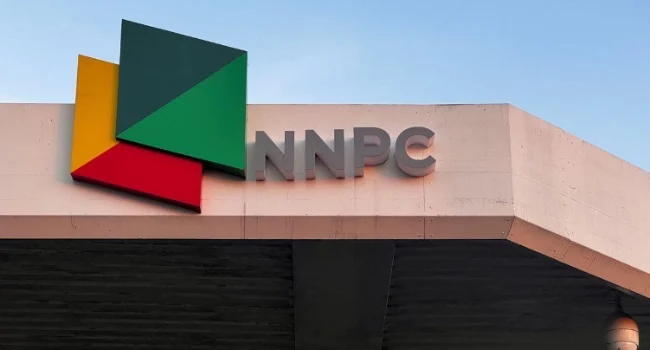The Nigerian National Petroleum Company (NNPC) Ltd is currently seeking a $2 billion loan in Europe, sources informed TheCable.
The loan would be repaid with 35,000 barrels of crude oil per day over the loan’s duration, according to insiders.
Recent reports by Reuters indicate that Mele Kyari, Group Chief Executive Officer (GCEO) of NNPC, is in negotiations for this new oil-backed loan to support the company’s operations.
However, the limited share of NNPC’s oil production raises concerns about the potential impact on its ability to supply crude to the Dangote refinery, which has been mandated to be paid in naira.
Nigeria’s current oil output is estimated at 1.3 million barrels per day, but the country’s share is believed to be less than half due to production sharing contracts (PSCs) governing offshore production.
Much of Nigeria’s share is already tied up in various loans and crude swap agreements to import petrol, which is sold at an average price of N700 per litre, despite landing costs exceeding N1,000 per litre.
The NNPC has consistently denied that petrol is still subsidized.
NNPC officials are reportedly in Europe, targeting Standard Chartered Bank in the UK for the loan, though no significant progress has been made so far, sources say.
Afreximbank Loan
This latest effort isn’t the first time the national oil company has sought financial support using crude oil as collateral. In August 2023, NNPC secured a $3 billion crude-backed loan from the African Export-Import Bank (Afreximbank) to support the naira and stabilize the foreign exchange market.
The company pledged 164.25 million barrels of crude oil, equivalent to 90,000 barrels per day starting from 2024, to repay the loan through Project Gazelle Funding Ltd, a special purpose vehicle incorporated in the Bahamas. By January, Afreximbank had disbursed $2.25 billion, with an additional $925 million released in June.
Dangote Refinery vs. Oil Industry Regulators
In recent weeks, tensions have escalated between the Dangote refinery and oil industry regulators, drawing significant attention. The refinery, which struggled to source crude oil locally, has now been prioritized by NNPC to receive local crude, which it will purchase in naira, potentially saving Nigeria over $610 million in foreign currency on fuel imports each month, according to Zach Adedeji, Chairman of the Federal Inland Revenue Service (FIRS).
On July 22, Aliko Dangote, Chairman of Dangote refinery, accused certain NNPC officials, oil traders, and terminals of operating a blending plant in Malta. This plant, while lacking refining capabilities, can blend re-refined oil with additives to create finished lubricant products.
The allegation intensified a conflict that began when the Nigerian Midstream and Downstream Petroleum Regulatory Authority (NMDPRA) claimed that local refineries, including Dangote’s, produce substandard petroleum products.
In response, Mele Kyari denied owning or knowing any NNPC employee who owns a blending plant in Malta.
The House of Representatives’ joint committee on petroleum resources (downstream and midstream) is currently investigating these allegations, including the purported production of inferior products by local refineries, the issuance of licenses, and the importation of substandard petroleum products into Nigeria.





















